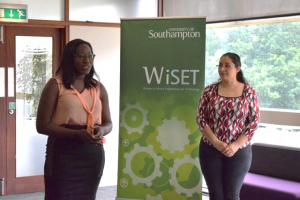WiSET Networking Lunch and Photography Exhibition
For the second year running, WiSET ran the annual WiSET awards to recognise the exceptional contributions of individuals across the university who have worked to raise the profile and participation of women in science, engineering, maths and medicine (STEMM). We were fortunate this year to have an exceptionally strong field of candidates for the 2017 WiSET awards and found it very challenging to pick only two.
We realised that many individuals and groups around the university are making huge contributions, supporting women in STEMM (see the bottom of the page for more information on the nominees and the work they do). Therefore we decided to throw a lunch for the nominees of the WiSET Awards 2017 to celebrate their achievements and create a space where they can network and find out what is happening elsewhere, outside of their faculties and departments. This unique networking opportunity was also joined by the Equality, Diversity and Inclusion department and other individuals that strive towards equality across the university.

As part of the lunch, Esther Collier, an up-and-coming photographer, was invited to display her exhibit of photographs of women working in what is typically thought of as male job roles. She had previously displayed her work at Southampton City College as part of the International Women’s Day. Esther initially took up photography following a serious accident which left her with many long-term difficult challenges including mobility problems and seizures. She began at an evening course, progressed onto the HNC and HND and is now doing a top up year at Southampton Solent University.

The lunch was a resounding success. The photography exhibition sparked ideas and initiated potential photography projects throughout the university to raise the awareness of women in STEMM. The event provided a platform where people could share ideas, discuss projects they are working on and receive feedback, support and advice. The lunch enabled people to discuss how they could combine their efforts to create joint projects for a stronger and more unified approach.

Acknowledging and thanking the individuals whose hard work benefits many throughout the university is key. Events like this gives the university an opportunity to show its gratitude and appreciation for the individuals that go above and beyond their job roles.
WiSET would like to thank once again all the nominees and guests for attending and making the lunch such a great event.
For more information on the WiSET Award nominees, please see the list below:

Katrina Morgan, Faculty of Physical Sciences and Engineering: is a research fellow in theoptoelectronics research centre (ORC). She was one of the key organisers for the city wide international women’s day event in 2017 which attracted a thousand members of the public in West Quay Shopping centre. She has run mentoring groups and career seminars over the past few years for women in STEM within the university. She set up and led the Nano Outreach group at the university which won an Impact award for the science and engineering day. Katrina became the co-chair of WiSET last year, has worked on Athena SWAN submissions in her previous department and now strives to achieve gender equality in her current department.

Nicola Symonds, FEE: is the principal enterprise fellow and first operations director of NC2. NC2 is a business unit within the faculty, providing industry with direct access to the facilities and staff through consultancy and applied research services. She is the only female Operations Director in the 40 year history of engineering enterprise at the University of Southampton. She volunteered to work with RAeS to promote women in aerospace, is now a founding committee member and became deputy chair. Nicola has helped to arrange several events held at the London society premises and across the country, promoting women in aerospace and has run and helped with many outreach activities, most in her own time. She gave a TEAtime lecture to visiting school children and provided solo workshops and key note speech for Dragonfly Day on forensic engineering, aimed at inspiring young school girls to consider engineering. She leads a tribology workshop utilizing innovative demonstrators. The demonstrators have also been used for two years running at the Science and Engineering Day. This year she has started Try Tribology – branding or badging the collective outreach work she has been leading concerning friction and wear. Nicola has also set up a dedicated email, website and merchandising. Nicola was invited into the Thomas Hardey School where she was part of meet the engineer day and has been an invited engineer at the schools day at Farnborough airshow. Finally, Nicola has supported a new initiative to inspire girl guides going to the university this Easter.

Adriana Wilde, Faculty of Physical Sciences and Engineering: is a Teaching Fellow in Electronics and Computer Science (ESC) and is writing her PhD on researching learning analytics in higher education. She is a member of the Higher Education Academy, ECS Senior Tutor, MSc Mentor Co-ordinator, MSc project supervisor and is the ECS representative in the Researching Assessment Practices SIG. Adriana gives a huge amount of time and energy to supporting, mentoring and inspiring other women not only in her field but across the university. Every year she co-ordinates a group of women at every academic level (UG, PGR, ECR, Academic) to attend the WomENcourage conference. She has given talks at the university’s Science and Engineering Day and arranged for talks from women in STEM at local schools. Adriana puts teachers in touch with networks in the university looking to encourage more STEM participation in girls and organises events for International Women’s Day and Ada Lovelace Day every year, from talks to lunches, both within ECS and in collaboration with the Women’s Physics Network. She always has time for helping all students and staff – and especially women – across the university face the many struggles of academic life.

Women’s Physics Network, Faculty of Physical Sciences and Engineering: The Women’s Physics Network (WPN) brings together female members of Physics & Astronomy, supports the career development of women within the department and more broadly champions gender equality and diversity in STEM. The network achieves its aims by hosting events throughout the year including inspirational talks, public engagement and outreach activities, and social events. The WPN was created in 2014 as part of Physics and Astronomy’s AthenaSWAN initiative. It has opened up discussion about gender and diversity issues in the department with targeted talks and events, and is currently helping us work towards AthenaSWNA Silver and Juno Champion status. The network itself is run by its own committee made up of postdoctoral researchers, PhD students, undergraduate students and a public engagement leader. WPN runs the People Like Me (PLM) workshop at many events, including Stargazing Live and the university science and engineering fair, to audiences of young girls (and boys) and their parents. WPN delivered an internal PLM workshop specifically to groups of year-8 girls. The WPN runs public Lectures by female scientists and science communicators, eg Prof Marika Taylor and Dr Melanie Windridge, to expose younger members of the public to female scientists and to encourage people of all genders to pursue STEM careers. WPN took part in the International Women’s Day City event at West Quay, engaging the public with research from the University, representing and promoting women in physics and welcoming discussions on gender equality in STEM. WPN devised a Scientist Treasure Hunt for the University’s Diversity Fortnight, highlighting women in science at the University. WPN brought together a wide range of women, from undergraduates to academic staff, to share knowledge and give advice.

Tiina Roose, Faculty of Engineering and the Environment: Tiina is a Professor in the faculty and has made a tangible difference to the development of early career researchers. She has taken responsibility for helping mentor them and help them to apply for competitive fellowships. She is a strong voice advocating for women in engineering, in particular. She is a very visible champion for women and has very rapidly developed as a leader. Tiina also walks the walk in terms of excellence having been a Royal Society University Research Fellow and more recently the holder of a European Research Council “consolidator grant”. She is a good collaborator and colleague and sets an excellent example.

Angeles Camacho Rosales, Faculty of Physical Sciences and Engineering: is a PhD student in the Optoelectronics Research Centre (ORC) and winner of the 2017 WiSET Award. She is an active committee member in the University of Southampton’s Optics and Photonics Society (OPSoc) and set up the Diversity Officer role in 2015 at the start of her postgraduate studies for OPSoc. She drove innovative activities within the student body of the ORC, engaging with more than 80 members from the university and 164 school students and members of the public through diversity focused activities. She put forward a proposal to incorporate a Diversity Officer as a committee member of the OPSoc. She also led a student-led group pilot scheme in 2015-16 for activities on the theme of “Women in Optics and Photonics”. Angeles organised and supported a set of activities that had a three-fold objective: (1) recognise the contribution of women to Optics and Photonics; (2) motivate society members to be part of a gender equality culture; and (3) encourage young women to choose optics and photonics as a career. She organised and supported two events specifically for young girls in schools and a further two networking and professional development events for university students and staff, engaging with 44 young girls aged 14-18 years and a further 40 members from across the university. These events were innovative for OPSoc, and led to it to become eligible for an SPIE Women in Optics grant. She applied for a 2017 grant for $500 USD that was successful and has continued to drive student-led activities through taking a lead role in the ORC student contribution at the 2017 Southampton International Women’s Day Celebrations, including outreach and public engagement activities in West Quay and a public panel at the Art House, reaching over 120 members of the public. She was a key part the organisation of sending a student delegation to the 2016 Association for Computing Machinery WomENcourage conference, Linz, Austria. Angeles led the ORC student contribution to the 2017 faculty celebration of International Women’s Day, which was attended by approximately 60 people and successfully raised over £500 through OPSoc’s affiliations (OSA, SPIE, IEEE Photonics Society, Union Southampton), to support events. Angeles acts as mentor for 2 new officers in 2016-17 in addition to being the treasurer for the society. She is ambassador for the OPSoc’s Optics Outreach Education programme, the Lightwave Roadshow and is involved in events for schools and in the University of Southampton’s Science and Engineering Day.

Kizanne James, Faculty of Health Sciences: is an International student on the Leadership and Management MSc course on scholarship and a winner of the WiSET Award 2017. Her dissertation is regarding the impact of work life balance on women getting into leadership roles within health (either clinical or academia). Kizanne is also a PGT member of the faculties’ Equality, Diversity and Inclusivity committee. Regarding her job in her own country (Trinidad and Tobago) although she is medically trained, she is currently an ambassador for promoting contraceptive use to school children back home, highlighting the plight of rape and abuse which is common but ignored. Not only promoting women in science by being an exemplary role model, but this work will be far reaching by endeavouring equality internationally and in a country where female rights are sadly lacking.
